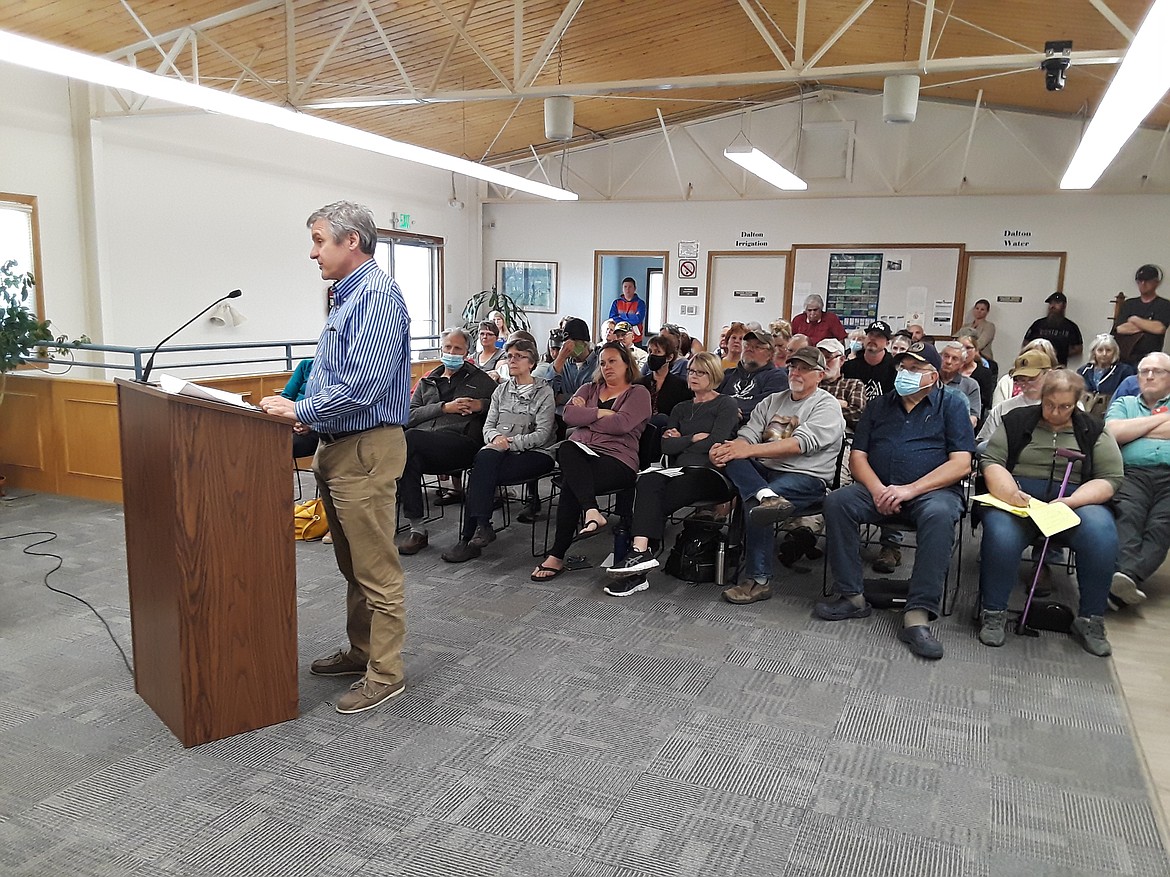Dalton Gardens targets deer issues in public workshop
Dalton Gardens residents and city officials alike warned against letting the deer problem pit neighbors against one another.
“We’re all neighbors,” Mayor Dan Edwards told a packed City Hall Wednesday night. “We’re all looking out for one another. That’s what this meeting is all about.”
More than 50 town residents came to a special workshop Wednesday designed to explore ideas to solve what many residents see as an ongoing problem in Dalton Gardens: Local deer are wandering down from Canfield Mountain and the surrounding wilderness into the city limits, where they promptly chew gardens and run into roads.
Deer have routinely come into Dalton Gardens for years, with the city at one point trying a trapping program to remove the creatures. Those attempts didn’t last, however, as many locals note a steady rise in the deer population.
After years of debate, the city is now considering a plan to allow trained bow hunters to kill deer that have strayed into town. The plan would authorize expert archers to perch in tree blinds and thin the herd from above.
"While the kids are in school, we do specific, highly-organized hunts,” Jim Flowers of the Coeur d’Alene Bowmen said. “I suspect we’d want to conduct these organized hunts at least five times, and then we would do an assessment. After three, four, maybe five months, how did we do? What were the positives and the negatives? How can we improve it?”
But many residents confronted that idea with questions Wednesday night. What happens if an arrow goes astray? What happens if the animal is wounded but doesn’t die? What happens if the wounded animal goes onto another property, one owned by someone who doesn’t approve of the thinning strategy? Questions of indemnification, liability, property values and trespassing were all brought up over the two-hour meeting.
The meeting was also an opportunity for locals to voice concerns about both deer running rampant and hunters creating unsafe conditions in town. Alternatives were suggested, including sterilization, re-location and euthenasia.
Jamie Smith, a long-standing opponent of the proposed hunts and part of the town’s deer committee in 2011, said educating the public on the dangers of domesticating wildlife was preferable to a hunting plan she called too vague to implement.
“Your [standard operating procedures] sound good on the surface but really are vague,” Smith said. “A lot of wording like ‘encourage’: How does that give me any peace of mind?”
But not all agreed.
“Through our own intervention to create a beautiful and lush living space, we have created a refuge for deer, with no hunting, no natural predators and a buffet of tasty food,” Jennifer Jenkins said. “… Our community is a special place, no doubt, but it is not a sanctuary.”
Lezlie Laviola said she never would have bought a house in Dalton Gardens if hunting was going to be allowed.
“Our town sets right at the base of Canfield Mountain,” she said. “There’s hundreds of miles of wilderness there. Why are you living right next to there? If you want to have this beautiful garden, move to the city. I’m sorry, but if you can’t exist with the wildlife, you shouldn’t live right next to the wilderness.”
But Virginia Grob, the daughter of a game warden, said that without a hard count of exactly how many deer the city is looking at, Dalton Gardens is shooting blind.
“I think the first thing this committee, this council, needs to do is get hard-backed science in front of them,” she said. “You really need to get science. There’s a lot of passion in this room. I don’t want to get pitted against my neighbor … Right now, a population survey is number one on your list.”
The council, staff and attendees considered putting a question on the November ballot, but some expressed concerns that six more months of debate would only polarize the community even further.
Because this was a workshop with no action item, no vote was cast. Edwards stressed the meeting was simply to gather input, not to make a decision. But he also said the city has to, at some point, make a decision.
“I know your frustrations, those of you that can’t stand these animals,” Edwards said. “I know your frustrations, those of you that love these animals. I love animals, too. I’m split 50-50. I know we need to do something. We, as your elected officials, we have to figure something out.”

